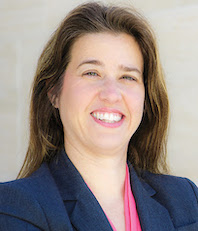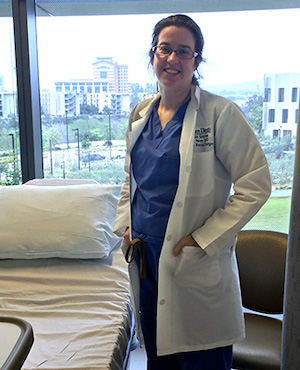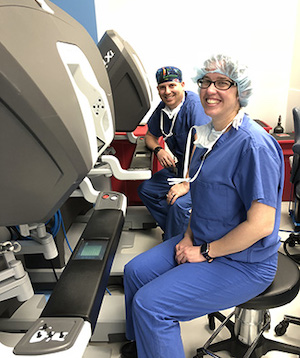Q & A with Lisa Parry
 Lisa Parry is Assistant Professor of Surgery in the Division of Colon and Rectal Surgery. In this interview, she discusses why she loves working with residents; innovations in robotic surgery; and dealing with fertility issues as a young female surgeon.
Lisa Parry is Assistant Professor of Surgery in the Division of Colon and Rectal Surgery. In this interview, she discusses why she loves working with residents; innovations in robotic surgery; and dealing with fertility issues as a young female surgeon.
April 17, 2018 | Interview by Lindsay Morgan
Where are you from and how did you get interested in colorectal surgery?
I grew up in Poway, so I’m a local girl. Born and raised. Went to Poway high school.
I always knew I wanted to go into medicine. I went to UC Davis for medical school, and during my surgery rotations, I fell in love with surgery. I loved being able to do stuff with my hands and really helping patients.
 I did my residency at Beth Israel Deaconess Medical Center in Boston and enjoyed the variety in colorectal—you can do hemorrhoids and fistulas and fissures, and big operations like removing someone’s colon and rectum and creating a j-pouch using their small bowel. I did a fellowship at a private practice group in Georgia and then went to work at Kaiser in Atlanta for three years. Then this job came up in March 2015, and I grabbed it.
I did my residency at Beth Israel Deaconess Medical Center in Boston and enjoyed the variety in colorectal—you can do hemorrhoids and fistulas and fissures, and big operations like removing someone’s colon and rectum and creating a j-pouch using their small bowel. I did a fellowship at a private practice group in Georgia and then went to work at Kaiser in Atlanta for three years. Then this job came up in March 2015, and I grabbed it.
You’ve had the perspective of starting out at Kaiser and then moving into an academic setting. How are those environments different?
My passion is teaching residents, so I enjoy the academics. Kaiser is more about seeing as many patients as you can.
What is it about working with residents that you enjoy most?
It’s exciting when someone says: I just did this case, and I couldn’t have done it without you. When you help to empower them, make them feel comfortable in the OR.
It wasn’t that long ago that you were a resident. What’s changed?
Residents’ expectations about work-life balance are changing. The work hours were overboard before—120 hours a week is just crazy. You don’t have time to sleep, you don’t have time to learn. But it’s almost like now the expectation is: when I’m at work I’m at work, and when I’m home I’m home. But when you’re an attending, you can be called late at night, and they don’t care if you’re off: it’s your patient.
What about for you—how do you balance your work life and your personal life?
Well, I have a super understanding husband. But one of the issues is family—I delayed having a family because it was never a good time. And now we’ve run into fertility issues, because I’m 37 and have never been pregnant. We’ve had to go through IVF, which has taken a lot of time and money.
I did IUI (Intrauterine insemination). That didn’t work. And then I did an IVF (In-vitro-Fertilization) cycle. That didn’t work. Then I went to Dr. Su at UCSD, and we went through egg retrieval. Only two of the eight fertilized. Each step felt like a knock down. We decided to transfer both of them. And now I’m 12 weeks pregnant. So, after all that, it did work, but it’s a journey with a lot of ups and downs.
Congratulations! Are you feeling relief yet or are you feeling nervous?
I’m nervous. We’ve seen the heart beat and it seems real; I passed my 1st trimester so that’s good. It’s just been so hard. And nobody really understands unless they’ve gone through it. You work hard your whole life trying to get somewhere and you’ve always been able to get there if you worked hard enough. But this is something that you can work really hard at and it doesn’t matter. You can’t control it.
I tell all my female residents, do egg retrieval now. It’s expensive, but then you have options. So, if you don’t meet your significant other until you’re older or you don’t have space in your career path until later, you still have options.
I imagine when you’re young and starting out, that mentor relationships can make or break your career. Tell me about Sonia Ramamoorthy (Division Chief, Colorectal Surgery) as a mentor and leader for you and the rest of the team.
Sonia’s a great partner. She’s definitely a mentor, but she’s really more like a sponsor. She’s all about promoting her junior colleagues. She’ll step aside so that we can start to be leaders in certain areas. And she’s always there for you if you need to discuss cases, and ask questions, or if you need help in the OR—she would come in a heartbeat. It’s really important to have people who you can call and ask for help.
 Robotic surgery is a burgeoning field, particularly in colon and rectal surgery. How is doing surgery with robots different or better than traditional approaches?
Robotic surgery is a burgeoning field, particularly in colon and rectal surgery. How is doing surgery with robots different or better than traditional approaches?
Something like 80 percent of colon and rectal cases are done using the robot at UCSD. It’s a major innovation, particularly in colorectal surgery. It gives me the ability to do a faster surgery; better ergonomics; articulation, which helps in the pelvis; it improves visualization of the anatomy; it’s safer; and it’s a great teaching tool.
Is robotic surgery fairly ubiquitous in San Diego?
Other centers use robots but generally our surgeons are more experienced and offer more robotic services. For example, we offer TAMIS (trans anal minimally invasive surgery) procedures robotically, which makes it easier to excise large poylps that would otherwise not be resectable. We also offer robotic ventral rectopexy which is a technique popular in Europe but making its way here with less risk for recurrence for rectal prolapse.
Last time we talked , you mentioned that residents were disinterested in robotics. Is that changing?
When I first came to UCSD, we didn’t have a robotics training curriculum, and a lot of the residents weren’t interested in the robots. It was pretty rare that I would get a chief resident in my case because they didn’t want to sit at the bedside the whole time.
But with Dr. Bryan Sandler, we developed the Department’s first robotics training curriculum, based largely on curriculum from the University of Alabama, which has extensive experience in training residents in robotic surgery. The curriculum stresses cross-disciplinary education, and includes simulation, web-based education, bedside assistant cases, and console cases.
Since we launched the curriculum, interest has grown, and we’ve had two residents who have asked for letters of completion for the robot.
We also hosted the 2017 UC Collaborative Symposium on Robotic Surgery Education, a UC-wide group of academic surgeon-educators whose goal is to improve the quality and consistency of resident education in robotic surgery.
How will we know if the training curriculum “works”?
We received a research grant from the American Society of Colon and Rectal Surgeons, both to develop and evaluate the curriculum. I’m working with research fellow Mark Zhao to study whether the curriculum changes the residents’ experience, what are the benefits, are they learning, and are more residents getting interested.
Has there been a day when you’ve thought— I don’t think I want to do this anymore. And has there been a day when you’ve thought: this is my vocation, this is what I’m supposed to do?
The worst day is when I had a patient die several days after my surgery. She had a colostomy and wanted to take it down. It was a difficult case, and then maybe because of hypotension in the OR or blood loss, her small bowel just spasmed and died. That was hard because we weren’t exactly sure what happened or why it happened, and she could have lived with a colostomy the rest of her life. I tried to steer her away from having surgery, but she kept coming back.
After something like that how do you get your confidence back?
You definitely feel a sense, not that you’re invincible, but you feel like you’re on a roll—you think, my patients are doing well, I’m a good surgeon. And then that knocks you for a loop and you just dread going into the OR. I think it just takes time—you have to grieve and talk with your colleagues and figure out what went wrong and what you can do differently next time. You also have to realize that you’re not the only one who this happens to.
What about the best day?
When I’m in the OR and the case is going well, things are moving along, you know the patient’s going to do well—those are the days when I think: I love it here, I love being in the OR, I love teaching.
